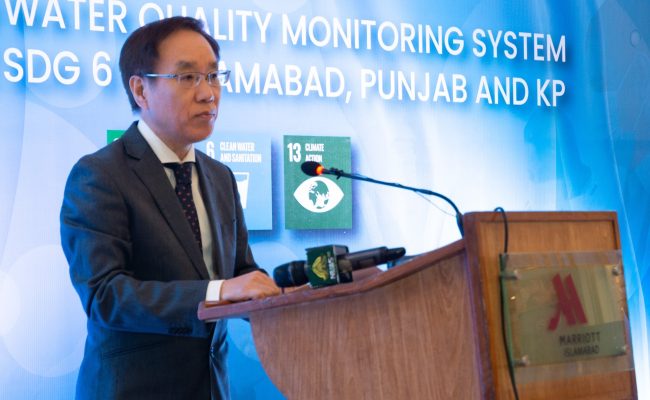By Abid Siddique Chaudhry
TWA
___
The Korea International Cooperation Agency (KOICA) and the United Nations Office for Project Services (UNOPS) have successfully concluded the Water Quality Monitoring Project in Pakistan. The initiative, implemented by UNOPS Pakistan in partnership with KOICA, aimed to fortify the technical and coordination capacity of the Government of Pakistan to monitor drinking water quality.
This groundbreaking project, conducted in close collaboration with Punjab and Khyber Pakhtunkhwa (KP) provincial governments, PCRWR, and Pak-EPA, has far-reaching implications, benefitting over 62 million people in the provinces of Khyber Pakhtunkhwa and Punjab & Islamabad.
Senator Mr. Muhammad Sabir Shah, Chief Guest at the closing ceremony in Islamabad, expressed pride in the enhanced laboratories, marking a pivotal move toward swift and precise water contaminant testing. He highlighted the initiative’s role in strengthening Pakistan’s capacity to tackle climate-related challenges and ensure the availability of safe and clean water for all.
The $4.4 million project involved upgrading 35 district laboratories in Punjab, 8 divisional labs in KP, and research and monitoring laboratories in Islamabad. The enhancements included the procurement and installation of advanced laboratory equipment, infrastructure improvements, capacity-building initiatives, and the introduction of a Management Information System (MIS) for improved coordination.

UNOPS, in collaboration with KOICA, equipped the laboratories with cutting-edge technology to test contaminants efficiently, ensuring the quick and accurate assessment of parameters outlined by WHO guidelines. Mobile laboratories, transformed from 8 vehicles for the Government of KP and 1 for PCRWR, will play a vital role in testing water quality in remote areas and responding to public health emergencies during natural disasters.
Korean Ambassador Mr. Ki-Jun Park expressed satisfaction with the project’s completion, emphasizing the Korean Government’s continued support for Pakistan, particularly in the water sector. The project aligns with Sustainable Development Goals 3 (Good Health and Wellbeing) and 6 (Clean Water and Sanitation), contributing to Pakistan’s Vision 2025 and the United Nations Sustainable Development Cooperation Framework for Pakistan 2023-2027.
Miss Jennifer Ankrom-Khan, UNOPS Country Manager for Pakistan, highlighted the project’s impact on public health, stating that millions will now have increased access to safe drinking water, thereby improving their quality of life.
This initiative not only advances health and sanitation goals but also addresses climate change (SDG 13), as water-quality monitoring becomes crucial in identifying contamination patterns and supporting communities during climate change-induced disasters.


